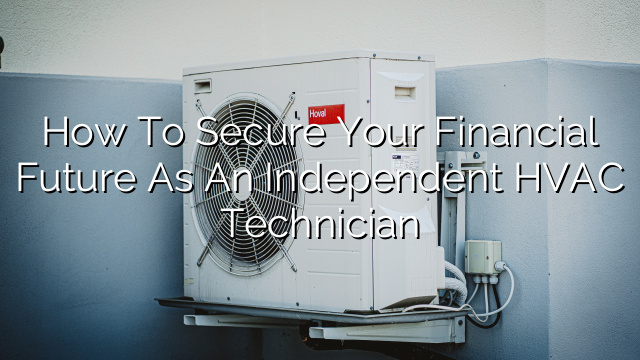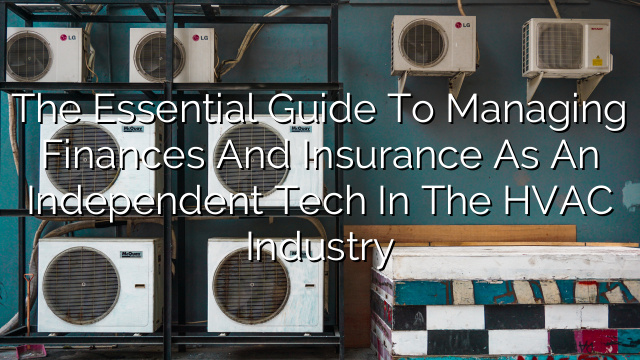Introduction
Being an independent HVAC technician can offer a great deal of freedom and flexibility in your career. However, it also brings with it the challenge of managing your own finances and securing your financial future. In this blog post, we will explore some strategies and tips to help independent HVAC technicians secure their financial future.
1. Create a Budget and Stick to It
One of the keys to securing your financial future is to create a budget and stick to it. This means tracking your income and expenses, and making sure you are spending less than you earn. This will help you avoid debt and build a solid financial foundation for the future.
2. Save for Emergencies
As an independent HVAC technician, it is important to have a financial safety net in case of emergencies, such as unexpected medical expenses or a slowdown in business. Aim to save at least three to six months’ worth of living expenses in an emergency fund.
3. Plan for Retirement
Even though retirement may seem far off, it is never too early to start planning for it. Consider setting up a retirement account, such as an Individual Retirement Account (IRA) or a Simplified Employee Pension (SEP) IRA. Contribute to your retirement account regularly and take advantage of any employer matching programs.
4. Invest in Your Skills
Continuing education and skill development are essential for staying competitive in the HVAC industry. Investing in your skills can not only lead to higher earning potential but also increase your job security. Set aside some funds each year for training and certifications.
5. Protect Yourself with Insurance
As an independent HVAC technician, it is important to have adequate insurance coverage to protect yourself and your business. Consider getting liability insurance, workers’ compensation insurance, and business property insurance. Also, make sure you have proper insurance coverage for your personal assets.
6. Diversify Your Income
Relying solely on HVAC repair and installation jobs for income can be risky. Consider diversifying your income by offering additional services, such as preventive maintenance contracts or energy efficiency audits. This can provide a more stable income stream and increase your earning potential.
7. Build Strong Customer Relationships
Building strong relationships with your customers can lead to repeat business and referrals. Satisfied customers are more likely to recommend your services to others, helping you expand your client base and secure future work.
8. Pay Off High-Interest Debt
If you have high-interest debt, such as credit card debt, prioritize paying it off as quickly as possible. High-interest debt can eat into your income and hinder your ability to save for the future. Consider using the debt snowball or debt avalanche method to tackle your debts.
9. Plan for Taxes
As an independent HVAC technician, you are responsible for your own taxes. It is important to set aside a portion of your income for taxes throughout the year. Consider working with a tax professional to ensure you are taking advantage of all available deductions and credits.
10. Seek Professional Financial Advice
Managing your finances as an independent HVAC technician can be complex. Consider seeking professional financial advice from a certified financial planner or a tax advisor who specializes in working with self-employed individuals. They can provide guidance on tax planning, retirement planning, and other financial matters.
Conclusion
Securing your financial future as an independent HVAC technician requires careful planning and diligent money management. By creating a budget, saving for emergencies and retirement, investing in your skills, protecting yourself with insurance, diversifying your income, building strong customer relationships, paying off high-interest debt, planning for taxes, and seeking professional financial advice, you can build a solid financial foundation and achieve your long-term financial goals.
FAQs
1. How much should I save for emergencies?
It is recommended to save at least three to six months’ worth of living expenses in an emergency fund. This will provide a financial safety net in case of unexpected expenses or a slowdown in business.
2. When should I start planning for retirement?
It is never too early to start planning for retirement. The sooner you start saving and investing for retirement, the more time your money has to grow and compound. Consider setting up a retirement account, such as an IRA or a SEP IRA, and contribute regularly.
3. What types of insurance do I need as an independent HVAC technician?
As an independent HVAC technician, it is important to have liability insurance, workers’ compensation insurance, and business property insurance to protect yourself and your business. Also, make sure you have proper insurance coverage for your personal assets.
4. How can I diversify my income as an independent HVAC technician?
Consider offering additional services, such as preventive maintenance contracts or energy efficiency audits, to diversify your income. This can provide a more stable income stream and increase your earning potential.
5. Should I work with a financial advisor?
Working with a certified financial planner or a tax advisor who specializes in working with self-employed individuals can provide valuable guidance on tax planning, retirement planning, and other financial matters. They can help you make the most of your income and secure your financial future.







